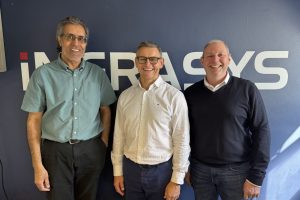Science park to spearhead innovation support network
.jpg)
THE complexities in Birmingham’s knowledge economy support structure need to be eradicated if the city is to become a fertile breeding ground for talent and innovative start-up businesses, the head of Birmingham Science Park Aston has said.
David Hardman said the current structure was too fragmented and complex to properly serve the needs of the city’s entrepreneurial community and Local Enterprise Partnership.
He said the concept of the ‘Triple Helix’ collaborative system between the private sector, government and academia was essential for success, as was the need to place the science park as the focal point of Birmingham’s innovation agenda.
The science park is spearheading the creation of the ‘Birmingham 2050 Forum’, with the intention of driving change and delivering greater success within Birmingham’s entrepreneurial community.
The forum will be a think-tank of successful emerging and established business leaders who will meet to spotlight issues and identify how barriers can be broken down to deliver a step-change in the level of new entrepreneurial activity that takes place in Birmingham.
“Birmingham’s support for its entrepreneurial community is not making headway because it is too complex and too fragmented, and as a consequence efforts are being diluted,” said Mr Hardman.
“We need to start doing something different so as to make available resources readily accessible and use the strengths of this legacy as the foundations for new growth.
“By creating the Birmingham 2050 Forum, we want to engage successful and established business leaders in the future of this city. We want to energise them – in association with emerging leaders – as a united force into giving something back and making a difference to the future economy of Birmingham. This doesn’t need to be a time onerous commitment, far from it.”
He said the science park was looking for fresh thinking to help stimulate the ideas which could eventually create successful businesses.
“Using the Science Park’s video technologies, we will further add to the debate with input from global entrepreneurs. But action must follow the thoughts, so we propose establishing a group of senior ‘delivers’ who will run with the ideas,” added Mr Hardman.
He said the science park wanted suggestions on who to invite to the inaugural 2050 Forum meeting.
“We need to get talking to the region’s highly impressive industry leaders and entrepreneurs across all sectors and explain the concept. Ultimately, this is about Birmingham working as a union and using the knowledge it already has to unearth and support the potential wealth creators of the future,” he said.
Once established, he said the forum was intended to work as a roadmap outlining the routes Birmingham needed to follow to become a truly global city.
“It will engage with all elements of the Triple Helix and work to inform the LEP board. This is all about recognising what needs to be done to make a difference and channelling the very limited pool of resources available in this economic climate in the right way,” he said.








